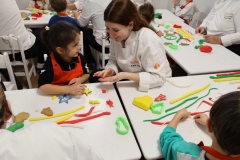
SCHOOL OF APPLIED MANAGEMENT SCIENCES
Gastronomy and Culinary Arts Program
GEIN 304 | Course Introduction and Application Information
| Course Name |
Applied Entrepreneurship and Innovation
|
|
Code
|
Semester
|
Theory
(hour/week) |
Application/Lab
(hour/week) |
Local Credits
|
ECTS
|
|
GEIN 304
|
Fall/Spring
|
4
|
0
|
4
|
6
|
| Prerequisites |
None
|
|||||
| Course Language |
English
|
|||||
| Course Type |
Service Course
|
|||||
| Course Level |
First Cycle
|
|||||
| Mode of Delivery | - | |||||
| Teaching Methods and Techniques of the Course | Group Work | |||||
| Course Coordinator | ||||||
| Course Lecturer(s) | ||||||
| Assistant(s) | ||||||
| Course Objectives | Entrepreneurship and innovation are the are the highest value-added elements in the new economy. This class aims to teach students interested in entepreneurship about creating awareness as applied to their career. ALL STUDENTS from ALL DEPARTMENTS would be able to select this course. |
| Learning Outcomes |
The students who succeeded in this course;
|
| Course Description | Providing theoretical information on entepreneurship and formulating a business plan, analyzing successful business models, preparing and presenting business models. |
|
|
Core Courses | |
| Major Area Courses | ||
| Supportive Courses | ||
| Media and Management Skills Courses | ||
| Transferable Skill Courses |
WEEKLY SUBJECTS AND RELATED PREPARATION STUDIES
| Week | Subjects | Related Preparation |
| 1 | Principle foundations of Entrepreneurs, Entrepreneurship, foundations of entrepreneurial thought, testing of entrepreneurial identity | Richard, Doug. (2013) How to Start A Creative Business: the jargon-free guide for creative entrepreneurs. Newton Abbot: David & Charles |
| 2 | Entrepreneurial process, developing business ideas, and creativity Techniques for solving creative problems, innovation | http://en.m.wikipedia.org/wiki/Lean_startup |
| 3 | Business plan concepts and business plan elements (market research) Researching the market with primary and secondary sources, identifying clients and their current and future needs | http://www.slideshare.net/mobile/redrocketvc/market-research-for-startups-13977653?qid=84822e7d-9803-4dd8-8366-957089d59fad&v=qf1&b=&from_search=6 |
| 4 | Business plan concepts and business plan elements (market research) Analysis of mixed marketing along the lines of the marketing plan (good, price, distribution) | http://en.m.wikipedia.org/wiki/Marketing |
| 5 | Business plan concepts and business plan elements (manufacturing, production/service plan) planning production | Workshop - Research |
| 6 | Business plan concepts and business plan elements (management plan) Considering management plan and its adaptation to the business plan Human resources management | Workshop - Research |
| 7 | Business plan concepts and business plan elements (financial plan) Finding financial sources, planning the investment, preparing the financial portrait, and principles of financial management, Accounting (budget and cash flow) | Workshop - Research |
| 8 | Market Research and workshop project according to the market plan | Workshop - Research |
| 9 | Manufacturing (production, service) plan workshop project | Workshop - Research |
| 10 | Workshop project for the management plan | Workshop - Research |
| 11 | Workshop project for the financial plan | Workshop - Research |
| 12 | Business plan concepts and a holistic view, for example business applications, sustainability, change management, and growth Information management | Workshop - Research |
| 13 | Preparing a Business Plan, Working on it, and Presenting | |
| 14 | Preparing a Business Plan, Working on it, and Presenting | |
| 15 | Preparing a Business Plan, Working on it, and Presenting | |
| 16 | Jury Presentations and Final Evaluations |
| Course Notes/Textbooks | Richard, Doug. (2013) How to Start A Creative Business: the jargon-free guide for creative entrepreneurs. Newton Abbot: David & Charles ISBN: 978-1-4463-0273-6 The Lean Startup - How Today's Entrepreneurs use Continious Innovation To Create Radically Sucessful Businesses' Eric Ries, Crown Business 2011 Web site: http://www.slideshare.net/mobile/PaulShawSmith/business-planning-for-startups
|
| Suggested Readings/Materials | http://en.m.wikipedia.org/wiki/Lean_startup http://en.m.wikipedia.org/wiki/Marketing http://www.slideshare.net/mobile/redrocketvc/market-research-for-startups-13977653?qid=84822e7d-9803-4dd8-8366-957089d59fad&v=qf1&b=&from_search=6 |
EVALUATION SYSTEM
| Semester Activities | Number | Weigthing |
| Participation |
1
|
10
|
| Laboratory / Application | ||
| Field Work | ||
| Quizzes / Studio Critiques | ||
| Portfolio | ||
| Homework / Assignments |
1
|
30
|
| Presentation / Jury |
1
|
40
|
| Project | ||
| Seminar / Workshop | ||
| Oral Exams |
1
|
20
|
| Midterm | ||
| Final Exam | ||
| Total |
| Weighting of Semester Activities on the Final Grade |
4
|
100
|
| Weighting of End-of-Semester Activities on the Final Grade | ||
| Total |
ECTS / WORKLOAD TABLE
| Semester Activities | Number | Duration (Hours) | Workload |
|---|---|---|---|
| Theoretical Course Hours (Including exam week: 16 x total hours) |
16
|
2
|
32
|
| Laboratory / Application Hours (Including exam week: '.16.' x total hours) |
16
|
2
|
32
|
| Study Hours Out of Class |
0
|
||
| Field Work |
0
|
||
| Quizzes / Studio Critiques |
0
|
||
| Portfolio |
0
|
||
| Homework / Assignments |
1
|
70
|
70
|
| Presentation / Jury |
1
|
15
|
15
|
| Project |
0
|
||
| Seminar / Workshop |
0
|
||
| Oral Exam |
1
|
20
|
20
|
| Midterms |
0
|
||
| Final Exam |
0
|
||
| Total |
169
|
COURSE LEARNING OUTCOMES AND PROGRAM QUALIFICATIONS RELATIONSHIP
|
#
|
Program Competencies/Outcomes |
* Contribution Level
|
||||
|
1
|
2
|
3
|
4
|
5
|
||
| 1 | Successfully applies theoretical and practical knowledge and skills in Gastronomy and Culinary Arts |
|||||
| 2 | Carries best practices in terms of work and food security, safety and hygiene in food production |
|||||
| 3 | Appreciates, evaluates and makes decisions regarding to visual, textual and nutritional data with respect to food production and presentation |
|||||
| 4 | Recognizes and evaluates the impact of gastronomy on culture and society |
|||||
| 5 | Assumes responsibility for solving complex problems that may occur in the field of Gastronomy and Culinary Arts, both individually and as a team member |
|||||
| 6 | Evaluates the knowledge and skills acquired in the field of Gastronomy and Culinary Arts with a critical approach and effectively communicate their ideas and suggestions for solutions in written and oral form. |
|||||
| 7 | Possesses necessary knowledge and skills in relevant fields such as gastronomy, design, law and management and effectively apply them to the practice of Culinary Arts |
|||||
| 8 | Uses the technological tools related to Gastronomy and Culinary Arts effectively |
|||||
| 9 | Updates and improve the knowledge, skills and competencies related to Gastronomy and Culinary Arts with lifelong learning awareness and sustainability with an ethical approach |
|||||
| 10 | Collects data in the areas of Gastronomy and Culinary Arts and communicate with colleagues in a foreign language. (European Language Portfolio Global Scale”, Level B1) |
|||||
| 11 | Speaks a second foreign at a medium level of fluency efficiently |
|||||
| 12 | Relates the knowledge gained through the history of humanity to the field of expertise |
|||||
*1 Lowest, 2 Low, 3 Average, 4 High, 5 Highest
NEWS |ALL NEWS
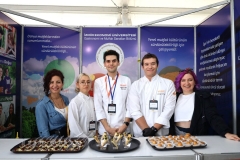
Aegean flavors from the chefs of the future
Izmir University of Economics (IUE) Department of Gastronomy and Culinary Arts left its mark on the 6th Izmir GastroFest, organized this year with
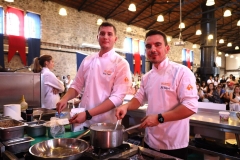
They added flavor to GURMEFEST
GURMEFEST, one of the biggest food, drink and entertainment festivals of Izmir, was ‘flavored’ with the dishes prepared and presented by the
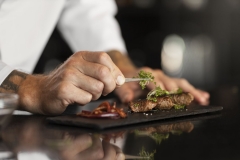
“Izmir and Bodrum will class up”
The MICHELIN Guide, one of the most prestigious restaurant rating systems in the world, has added Izmir and Bodrum to its Turkish
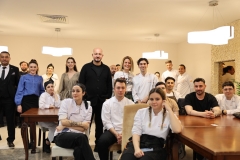
IUE graduates will prepare the flavors unique to Turkish cuisine
Bilsev Group, who is preparing to expand to Dubai this year with its Ferdi Baba, Fabrice Restaurant and Baba Pizza brands, will
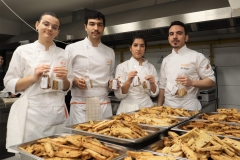
They prepared products that are filling and have a long shelf life
25 students of Department of Gastronomy and Culinary Arts of Izmir University of Economics (IUE) prepared products with a long shelf life,




